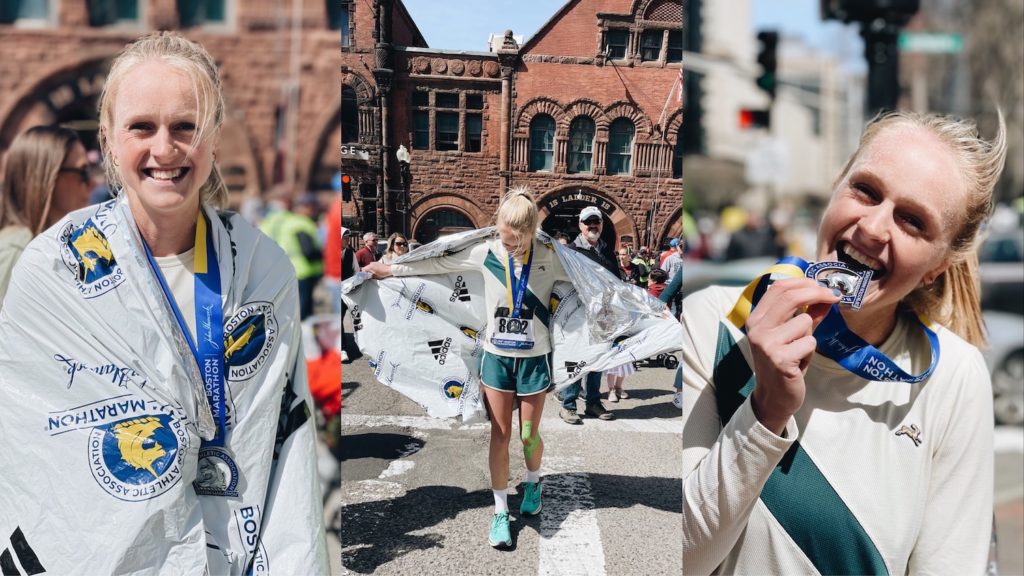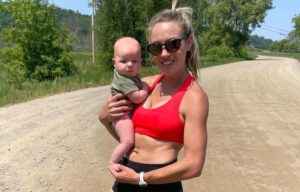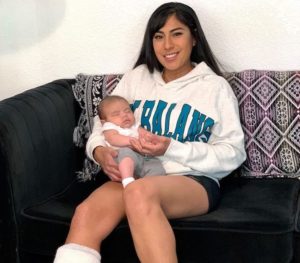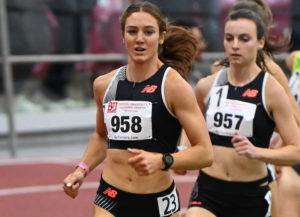
By Alison Wade
Shortly after Emilee Risteen crossed the finish line last Monday at the Boston Marathon, she texted her coach, “Is this real life?” Her disbelief was understandable. Risteen, 26, ran her first marathon, two and a half years ago, in 4:03:59, and on Monday, she finished 33rd among more than 10,000 women in the race, running 2:42:25.
There were intermediate steps along the way, and Risteen improved her marathon time to 3:04:16 last November in New York, but her time in Boston was still a personal best by nearly 22 minutes. Risteen’s qualifying time was only good enough to get her into wave two of the race. So she started 40 minutes after the pro women and 25 minutes after wave one. She saw very few people during the first eight miles—fitting for someone who trains alone—and it wasn’t until past halfway that she saw crowds of runners.
“I was kind of hoping to have somebody I could pace with, but when I think back on the race, it was just such a fun experience overall that I really didn’t put much thought into it,” she said. “My coach kept saying, ‘Rhythm, rhythm, find a rhythm,’ and then once I found it, I just kind of hung on to see how long it could go for. And it just happened to go for the whole thing.”
Risteen was the first runner, male or female, with a wave two bib to cross the finish line.
“Never again” to getting hooked
Growing up in Derry, New Hampshire, Risteen was a soccer player. During high school, at Concord Christian Academy, she was a big fish in a small pond, but Risteen says she was just average at the sport. She hoped to play soccer for a small Division III school, but when Chicago’s Moody Bible Institute, which did not have a women’s soccer team, offered her free tuition, she went the “financially wise” route.
Though she played intramural sports at Moody, it was the first time in Risteen’s life that she wasn’t on a team, which was a tough adjustment. She began running to fill that void. “It was a time in my life where I was struggling in my faith so I used running as my way to connect with God,” she said.
At the end of college, Risteen did some student teaching in Tanzania, and when she saw there was a half marathon taking place, she decided to enter, though her longest run ever was 7 or 8 miles. “It was a terrible experience,” she said. “It was so hot and I think I ran like 13-minute miles and I crossed that finish line and said, ‘I’m never going to run a half marathon again.’”
After graduating, Risteen moved home and started substitute teaching while she looked for a teaching job. “It was a season in my life where I worked through a lot of mental health challenges and I used running as a way to cope—and still do—with all of that,” she said.
During college, the Chicago Marathon ran by Risteen’s dorm every year, and she had always thought she’d like to try it someday. When she saw an opportunity to run the race while raising money for World Vision, she jumped at the chance but didn’t put a lot of thought into it. She followed a training plan she found online.
She had never practiced fueling before, but she took gels for the first time during the race, which resulted in some GI issues. But still, she had a blast, and ran 4:03:59. “It was wonderful. I loved every second of it,” she said. “That was when the fire for the marathon [began].”
Getting serious
Risteen signed up to return to Chicago and fundraise again the following year, but the pandemic canceled the race, so she ran it virtually, figuring that because she had already collected some donations, she should go through with it. Her gym was closed, so she put more of her energy into running.
“The pandemic was so hard for everyone,” Risteen said. “You lose so much of what you’re used to doing. Running became a huge outlet for me, because I had more time on my hands. I needed a break from everything in the world.”
She increased her training volume from roughly 40–50 miles per week to 50–75. Following her sister on a bike, Risteen ran 3:38, roughly one minute per mile faster than one year earlier.
At the beginning of 2021, Risteen hired Abby Stanley to be her coach. She wanted to qualify for the Boston Marathon, and she was tired of feeling like she didn’t know what she was doing. “From the moment I talked to her the first time, I just knew it was going to work out well,” Risteen said. “I owe so much of my success to her.”
Stanley said that it was clear that with some structure, Risteen could run much faster than she had. But there was a learning curve. “When I started with her—we were actually just laughing about this—she gave me strides to do and I had to google what that was. I had no understanding of running terminology at all,” said Risteen. And, Stanley said, Risteen also needed to learn to slow down on her easy days.
Risteen returned to the Chicago Marathon in 2021, hoping to break 3:00, but in the warm, humid conditions, she struggled, running 3:07:10. It was another huge personal best, more than a minute per mile faster than her virtual marathon, but Risteen knew she was capable of more. She had planned to run the New York City Marathon for fun four weeks later, but after her frustrating run in Chicago, she decided to run New York more seriously. She went through halfway in 1:23:49 and faded, running 3:04:16. She was disappointed, but it was yet another personal best.
Nailing it
During her Boston buildup, Risteen focused on running faster paces for longer periods of time “so that when it starts to hurt, I know how to stay in it,” she said. She consistently churned out 95–100 mile weeks, and the training went well. She and Stanley thought that 2:45 was a realistic goal, while recognizing that Boston’s course can be a tough one to conquer.
Risteen won the Hampton Half Marathon in early March, running 1:20:06, and she won the Eastern States 20 Mile, running at 80 percent effort. Those races, plus a hilly 24-mile run where she averaged 6:30 pace, gave her confidence. (In Boston, she averaged 6:11/mile.)
When Risteen went into Boston to pick up her race number on Saturday, she could feel the energy and excitement surrounding the race. She stopped by Tracksmith’s Trackhouse (“I’m obsessed,” she says of their clothing) and learned that Molly Seidel would soon be making an appearance nearby. She got to see Seidel, who is one of her favorite runners. “Her openness and her willingness to let people into her story—which is a very relatable story for me, in terms of her mental health—has been huge for me,” Risteen said. She also went to the finish line to take it all in before heading back home to celebrate Easter.
Risteen spent Sunday night in Boston, and on race day, she had a strong cheering squad. Several of her five siblings, her parents, her nephew, and two close friends spread out to cheer her on along the course. Stanley followed Risteen’s splits on the race app, from California. “She followed the race plan we talked about so well, I was so proud of that,” Stanley said. “It would’ve been easy for her to get out way too fast on that course, especially starting back in corral two and feeling like she needed to go chase people down.”
Risteen didn’t realize how quickly she was running until she reached mile 25 and calculated that she only had to cover the last 1.2 miles in 10 minutes to reach her 2:45 goal time. Meanwhile, the tracker stopped updating her splits after 35K, so Stanley began to worry something had happened. But then she received a text from Risteen with her finishing time: 2:42:25. “Best text ever!” Stanley said.
Risteen hoped to go back to Tracksmith after the race to get a poster stamped with her finishing time, but being a Boston newbie, she ended up on the wrong side of the course and abandoned that plan. She wiped herself down with baby wipes, changed clothes, went home to New Hampshire, and ate pizza to refuel.
Risteen already has her next marathon in mind—she’d like to go after the U.S. Olympic Marathon Trials qualifying time of 2:37:00 at the California International Marathon in December, where she and Stanley hope to finally meet in person. But Stanley also wants to make sure Risteen appreciates what she just accomplished. “She’s still very new to everything and right now I want her to enjoy what happened at Boston and not be so rushed to get on to bigger things,” she said.
Risteen was back on another starting line five days after Boston, helping her friend complete her first 10K in 71 minutes. Risteen is currently coaching track & field at her former high school, helping rebuild the program. And having never competed in the sport, she said she’s learning a lot along the way. She also works 45–50 hours per week managing an ice cream shop from April to October. Risteen hopes to focus on some shorter races through the summer and then ramp up her CIM training as things slow down a bit at work.
“I want her training to be sustainable and something she enjoys; not that she must prove anything to anyone,” Stanley said. “There are going to be good days and bad days in the journey ahead, and I think it’s just a balance of knowing when to push and when to hold back. I’m so excited for her to keep going after her dreams and getting to be here to cheer her on.”
To have content like this delivered to your inbox each Monday morning, subscribe to the Fast Women newsletter here.





